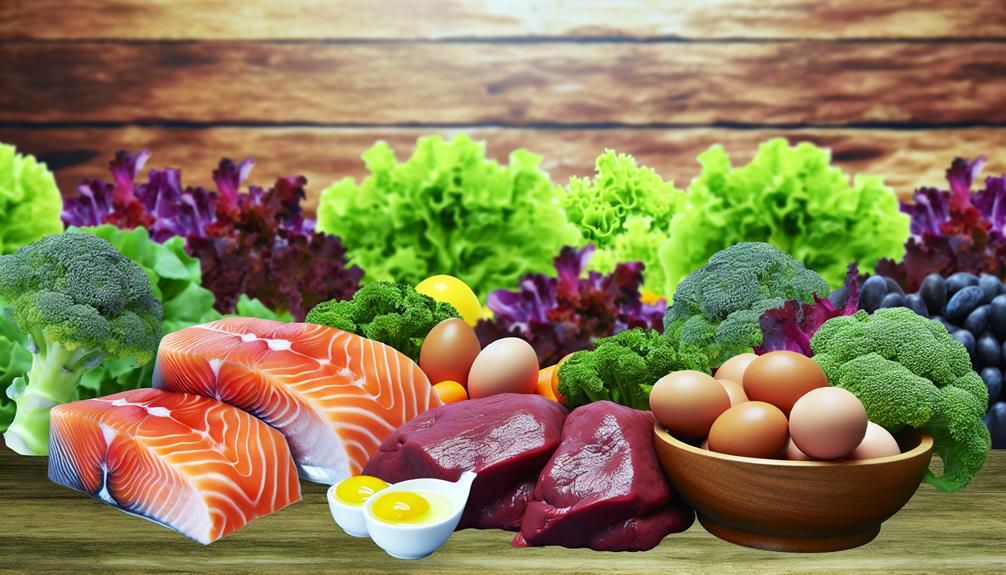I believe understanding key vitamins for male hormone balance is essential for overall health. Vitamin D regulates testosterone and boosts mood. The B vitamins, especially B6 and B12, support hormone synthesis and energy levels. Vitamin C enhances testosterone production, while Vitamin E acts as an antioxidant for reproductive health. Vitamin K and folate help regulate hormones and DNA synthesis. Zinc is critical for testosterone maintenance, and magnesium supports hormone regulation and sleep quality. Incorporating these vitamins into your diet can greatly improve hormonal balance. There's more to discover about how these factors contribute to your vitality and well-being.
Vitamin D

When it comes to maintaining hormone balance, I can't stress enough how significant vitamin D is. This vitamin, often referred to as the "sunshine vitamin," plays a essential role in various bodily functions, including hormone regulation. The vitamin D benefits are extensive, particularly for testosterone levels in men. Studies have shown that adequate vitamin D can help boost testosterone production, which is crucial for muscle growth, energy levels, and overall well-being.
However, many of us face vitamin D deficiency, especially if we spend a lot of time indoors or live in areas with limited sunlight. This deficiency can lead to a host of problems, including fatigue, mood swings, and reduced libido. In fact, some research suggests that men with low vitamin D levels may experience lower testosterone levels, which can negatively impact their health.
To maintain sufficient vitamin D levels, I recommend getting outside for at least 15-30 minutes of sunlight exposure a few times a week. If that's not feasible, consider incorporating vitamin D-rich foods like fatty fish, egg yolks, and fortified dairy products into your diet. Additionally, a vitamin D supplement can be an excellent option, especially during winter months when sunlight is scarce.
Vitamin B6
When it comes to hormone regulation, Vitamin B6 plays an essential role that I find fascinating. It not only assists in the synthesis of neurotransmitters but also impacts hormones like testosterone. Let's explore where we can get this vitamin and what the recommended dosage guidelines are for best benefits.
Role in Hormone Regulation
Vitamin B6 plays an important role in hormone regulation, influencing various physiological processes that are fundamental for maintaining male hormone balance. This vitamin is critical for hormone synthesis, particularly in the production of neurotransmitters like serotonin and dopamine, which indirectly affect hormone levels. When I think about how our bodies manage hormones, I can't overlook the importance of B6 in supporting endocrine health.
Studies have shown that adequate levels of Vitamin B6 can improve testosterone levels and overall reproductive health. It's fascinating to note that B6 helps regulate the secretion of hormones by promoting the health of the pituitary gland, which is a key player in hormone production.
Additionally, Vitamin B6 is involved in the metabolism of steroid hormones, which means it can influence how effectively our bodies use and respond to these hormones. If you're looking to maintain a balanced hormonal environment, ensuring you get enough B6 in your diet is fundamental. Remember, a well-functioning endocrine system is crucial for overall health, and Vitamin B6 is a key player in this intricate process. So, don't underestimate its importance!
Sources of Vitamin B6
Maintaining adequate levels of Vitamin B6 is essential for hormone balance, but knowing where to find this nutrient can make all the difference. I've found that incorporating a variety of food sources into my diet is the most effective way to guarantee I get enough B6. Foods rich in Vitamin B6 can help support my overall health and hormone levels.
Here's a quick reference table outlining some excellent food sources of Vitamin B6:
| Food Source | Vitamin B6 Content (mg per 100g) |
|---|---|
| Chicken Breast | 0.64 |
| Salmon | 0.73 |
| Potatoes | 0.29 |
| Bananas | 0.37 |
| Spinach | 0.19 |
If you find it challenging to get enough from your meals, there are also supplement options available. However, I recommend focusing on whole foods whenever possible, as they provide additional nutrients that work synergistically with B6. By prioritizing these food sources, I've noticed a positive impact on my hormone balance, and I believe you can too!
Recommended Dosage Guidelines
Getting the right amount of Vitamin B6 is essential for supporting hormone balance, and understanding the recommended dosage can help guarantee you're on the right track. The recommended dietary allowance (RDA) for Vitamin B6 varies based on age and gender. For adult men, the RDA is typically around 1.3 mg per day, but it increases to 1.7 mg for older age groups, specifically men over 50.
It's important to take into account these dosage variations, as individual needs can differ greatly. Factors like diet, lifestyle, and health status can influence how much B6 you should be getting. If you're active or under stress, you might require more than the standard RDA.
For most people, obtaining Vitamin B6 through a balanced diet rich in sources like poultry, fish, potatoes, and non-citrus fruits is sufficient. However, if you're contemplating supplements to boost your intake, it's wise to consult with a healthcare professional first. They can help tailor the dosage to your specific needs, ensuring you support your hormone balance effectively without risking toxicity, which can occur at excessively high doses.
Vitamin B12

Among the many nutrients essential for hormone balance, B12 plays a significant role in supporting male health. This water-soluble vitamin is important for the production of red blood cells and DNA synthesis, but its impact extends far beyond that. A B12 deficiency can lead to significant health issues, including fatigue, mood disturbances, and even neurological health problems.
From my research, I've found that maintaining adequate B12 levels may help enhance energy and improve mood, both of which are important for hormonal balance. Low energy and irritability can disrupt the delicate balance of hormones like testosterone, affecting everything from muscle mass to libido.
For men, B12 is particularly important because it supports the adrenal glands, which play a significant role in managing stress. Chronic stress can lead to hormonal imbalances, so ensuring your B12 levels are ideal can contribute to better stress management and overall hormonal health.
Sources of B12 include animal products like meat, dairy, and eggs, making it essential for those following a plant-based diet to evaluate fortified foods or supplements. Regular blood tests can help identify any deficiency before symptoms arise.
Vitamin C
Vitamin C is essential for maintaining ideal male hormone balance, and its benefits extend beyond just immune support. This powerhouse vitamin plays a pivotal role in testosterone production, which is critical for various bodily functions, including muscle mass maintenance and overall vitality. Research suggests that adequate Vitamin C levels can help boost testosterone and improve reproductive health.
To make the most of Vitamin C, it's important to know which sources you can incorporate into your diet. Below is a table highlighting some of the best sources of Vitamin C along with their benefits:
| Vitamin C Sources | Vitamin C Benefits |
|---|---|
| Oranges | Boosts immunity and hormone production |
| Kiwi | Supports collagen synthesis and mood |
| Bell Peppers | Enhances iron absorption and energy |
| Strawberries | Aids in antioxidant protection |
Including these foods in your daily meals can greatly enhance your Vitamin C intake. Not only will you reap the hormonal benefits, but you'll also enjoy the overall health improvements that come with a diet rich in antioxidants.
If you're looking for a practical way to balance your hormones naturally, consider adding a serving of these Vitamin C-rich foods to each meal. Trust me, your body and hormone levels will thank you for it!
Vitamin E

There's no denying that Vitamin E plays a crucial role in maintaining male hormone balance. This fat-soluble vitamin is known for its antioxidant properties, helping to protect cells from oxidative stress, which can affect hormone production. Studies suggest that adequate Vitamin E levels may support testosterone levels, making it a significant nutrient for men seeking hormonal balance.
One of the key Vitamin E benefits is its ability to improve blood circulation, which can enhance overall energy and sexual health. Additionally, it may aid in reducing inflammation, a factor that can disrupt hormone function. When I think about enhancing my hormone levels, I make sure to include Vitamin E-rich foods in my diet.
So, where can you find quality Vitamin E sources? Nuts and seeds are excellent options; for instance, almonds and sunflower seeds are particularly rich in this vitamin. Spinach and avocados also contribute to a healthy intake of Vitamin E. If you're looking for a quick snack, a handful of nuts can be a perfect choice.
For those who might struggle to get enough from food alone, supplements are available. However, I'd recommend consulting with a healthcare professional before starting any supplement regimen. By incorporating Vitamin E into my diet, I feel more empowered to support my hormone balance naturally, ensuring my body functions effectively. Remember, a balanced diet is key to maintaining healthy hormones.
Vitamin A
Essential for numerous bodily functions, Vitamin A plays an important role in maintaining male hormone balance. As I've learned, this vitamin not only supports vision and skin health but also directly impacts testosterone production. A well-balanced testosterone level is critical for male reproductive health, energy levels, and overall well-being.
Let's break down some of the key benefits and sources of Vitamin A:
| Vitamin A Benefits | How It Affects Hormone Balance | Vitamin A Sources |
|---|---|---|
| Supports testosterone production | Helps in the synthesis and regulation of hormones | Carrots |
| Enhances immune function | Promotes overall health, indirectly supporting hormones | Sweet potatoes |
| Aids in cellular communication | Guarantees proper signaling between hormones and cells | Spinach |
| Improves skin health | Healthy skin reflects overall hormonal balance | Kale |
| Contributes to eye health | Prevents vision problems, helping maintain overall vitality | Beef liver |
Incorporating Vitamin A into your diet can be straightforward. Foods like carrots, sweet potatoes, and leafy greens are excellent sources, and I often find that a colorful plate can help me meet my nutritional needs. Remember, it's about balance—too much Vitamin A can lead to toxicity, so moderation is key. By prioritizing these foods, I can support not just my hormone balance but my overall health as well.
Vitamin K

How does Vitamin K play a role in maintaining male hormone balance? It's fascinating how this often-overlooked vitamin can impact our hormonal health. Vitamin K is primarily known for its role in blood clotting, but it also plays an essential part in regulating testosterone levels. Research suggests that adequate Vitamin K levels may help improve testosterone production, which is fundamental for male hormone balance.
One of the key Vitamin K benefits is its ability to support bone health and improve vascular function, both of which are linked to maintaining hormonal levels. When our bones and blood vessels are healthy, it can enhance overall hormonal balance, potentially leading to better mood, libido, and energy levels.
So, where can you find Vitamin K sources? I've found that leafy green vegetables like kale, spinach, and broccoli are excellent options. If you enjoy fermented foods, natto, a Japanese dish made from fermented soybeans, is loaded with Vitamin K. Additionally, you can get Vitamin K from dairy products and certain meats, like liver.
Incorporating these foods into my diet has been a game-changer for my overall health. It's worth considering how adding more Vitamin K-rich foods can support not just blood clotting, but also hormonal balance. If you're looking to optimize your health, keeping an eye on your Vitamin K intake is definitely something to think about!
Folate
Many people may not realize the significant role folate plays in maintaining male hormone balance. Folate, a B-vitamin, is essential for DNA synthesis and repair, which is fundamental for the production of healthy sperm. Research indicates that adequate folate levels can positively influence testosterone levels, thereby supporting overall hormonal stability.
One of the key folate benefits is its ability to reduce homocysteine levels in the blood. Elevated homocysteine can lead to various health issues, including cardiovascular problems and hormonal imbalances. By keeping these levels in check, folate helps create an ideal environment for hormone production.
Now, you might be wondering where to find folate sources. Fortunately, it's abundant in a variety of foods. Leafy greens like spinach and kale are excellent choices, along with legumes such as lentils and chickpeas. Additionally, fortified cereals and whole grains can provide a significant boost to your folate intake. If you're looking for something different, avocados and citrus fruits also offer a healthy dose of this essential nutrient.
Incorporating these folate sources into your diet can be a straightforward way to enhance your hormonal health. It's not just about quantity; the quality of your diet matters too. Aim for a balanced intake of folate-rich foods to support your body's natural hormone production. Remember, maintaining a healthy hormone balance is a journey, and folate plays a fundamental part in that process.
Zinc

Zinc is an essential mineral that plays an important role in maintaining male hormone balance, particularly testosterone levels. I've found that many men unknowingly suffer from zinc deficiency, which can lead to reduced testosterone production, affecting everything from energy levels to mood and libido. When I learned about this, I realized how vital it is to monitor my zinc intake.
Zinc supplementation can be a practical solution for those who are deficient. Research indicates that supplementing with zinc can help restore testosterone levels to a healthy range, especially in men with low baseline levels. It's important to remember that while supplementation can be beneficial, it's best to consult a healthcare professional to determine the right dosage for your individual needs.
Here's a quick overview of zinc's benefits, sources, and considerations:
| Aspect | Details |
|---|---|
| Benefits | Supports testosterone production and immune function. |
| Sources | Oysters, red meat, poultry, beans, nuts, and whole grains. |
| Considerations | Excessive zinc can lead to toxicity; aim for balance. |
Incorporating zinc-rich foods into your diet or considering supplementation can greatly enhance your hormonal health. By being proactive about my zinc levels, I've noticed improvements in my overall well-being. If you suspect you might be experiencing symptoms of zinc deficiency, it's worth discussing with a healthcare professional to explore your options.
Magnesium
Maintaining a balanced intake of minerals is just as important as monitoring zinc levels, and magnesium is another key player in supporting male hormone balance. As I've explored the connection between magnesium and testosterone, I've come to understand just how essential this mineral is for our health. Magnesium benefits extend beyond muscle function and energy production; it plays an important role in regulating hormone levels, including testosterone.
Research shows that magnesium deficiency can lead to low testosterone levels, which can affect mood, energy, and overall vitality. Many men don't realize they may not be getting enough magnesium in their diets, especially if they consume a lot of processed foods. Incorporating magnesium-rich foods like leafy greens, nuts, seeds, and whole grains can help alleviate this deficiency and support hormone balance.
I've also discovered that magnesium may help improve sleep quality, which is essential for testosterone production. Poor sleep can lead to increased stress and hormonal imbalances, so focusing on magnesium can have a ripple effect on our overall well-being. If you're concerned about your magnesium intake, consider discussing it with a healthcare professional who can recommend appropriate supplements or dietary changes.
Frequently Asked Questions
How Do Lifestyle Choices Affect Vitamin Absorption for Hormone Balance?
I've found that lifestyle choices greatly impact vitamin absorption, especially when it comes to hormone balance. For instance, incorporating dietary fats into my meals enhances the absorption of fat-soluble vitamins. Plus, maintaining good gut health is essential; a healthy gut microbiome helps break down nutrients effectively. If I neglect these factors, I could miss out on essential vitamins, ultimately affecting my overall hormone levels and well-being.
Can I Get Enough Vitamins From Diet Alone?
I often picture a vibrant plate, overflowing with colorful fruits and vegetables. It's tempting to think I can get all my vitamins from diet alone, but it's not always that simple. Vitamin bioavailability varies; some dietary sources deliver nutrients more efficiently than others. While a balanced diet is essential, I've found that supplements can help fill in the gaps, ensuring I meet my needs for ideal health and well-being.
What Are Common Symptoms of Vitamin Deficiencies in Men?
When I think about vitamin deficiency symptoms in men, I notice they're often subtle but impactful. Common indicators include fatigue, mood swings, and decreased libido, which can signal hormone imbalance. I've read that deficiencies in vitamins like D and B12 can lead to these issues. It's vital to pay attention to our bodies; if something feels off, it might stem from a lack of essential nutrients. Regular check-ups can help identify these deficiencies early.
Are There Any Side Effects of Taking Vitamin Supplements?
When I think about taking vitamin supplements, I've learned there can be side effects, especially with vitamin toxicity. Overdoing it on certain vitamins can lead to serious health issues. I've also noticed that supplements can interact with medications I'm taking. It's essential to consult a healthcare professional before starting any regimen. Staying informed helps me make better choices and avoid potential pitfalls related to vitamin intake and its interactions.
How Can Stress Impact Male Hormone Levels and Vitamin Needs?
Stress really impacts our hormone levels, especially with elevated cortisol levels. I've learned that when stress hormones spike, they can disrupt the balance of testosterone and other essential hormones. This imbalance can increase our vitamin needs, particularly for those involved in hormone production, like B vitamins and vitamin D. Managing stress through mindfulness or exercise can help keep cortisol in check, which in turn supports better hormone balance and overall health.
